Related Research Articles

"You Keep Me Hangin' On" is a song written and composed by Holland–Dozier–Holland. It was first recorded in 1966 by American Motown group the Supremes, reaching number one on the Billboard Hot 100. American rock band Vanilla Fudge released a cover version in June the following year, which reached number six on the Billboard Hot 100. English singer Kim Wilde covered "You Keep Me Hangin' On" in 1986, reaching number one on the Billboard Hot 100 in June 1987. In the first 32 years of the Billboard Hot 100 rock era, "You Keep Me Hangin' On" became one of the six songs to reach number one by two different musical acts. In 1996, American country singer Reba McEntire's version reached number two on the US Billboard Hot Dance Club Play chart. The BBC ranked the Supremes' original song at number 78 on The Top 100 Digital Motown Chart, which ranks Motown releases by their all-time UK downloads and streams.
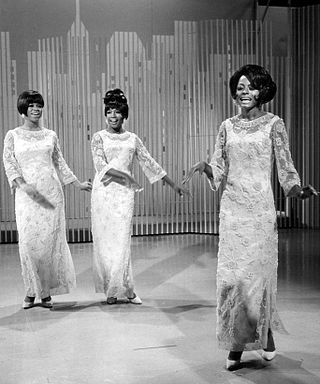
American girl group The Supremes have released 29 studio albums, four live albums, two soundtrack albums, 32 compilation albums, four box sets, 66 singles and three promotional singles. The Supremes are the most successful American group of all time, and the 26th greatest artist of all time on the US Billboard charts; with 12 number-one songs on the Billboard Hot 100 and three number-one albums on the Billboard 200. The Supremes were the first artist to accumulate five consecutive number-one singles on the US Hot 100 and the first female group to top the Billboard 200 albums chart with The Supremes A' Go-Go (1966). In 2017, Billboard ranked The Supremes as the number-one girl group of all time, publishing, 'although there have been many girl group smashes in the decades since the Supremes ruled the Billboard charts, no collective has yet to challenge their, for lack of a better word, supremacy.' In 2019, the UK Official Charts Company placed 7 Supremes songs—"You Can't Hurry Love" (16), "Baby Love" (23), "Stop! In the Name of Love" (56), "Where Did Our Love Go?" (59), "You Keep Me Hangin' On" (78), "Come See About Me" (94) and "Stoned Love" (99)—on The Official Top 100 Motown songs of the Millennium chart, which ranks Motown releases by their all-time UK downloads and streams.
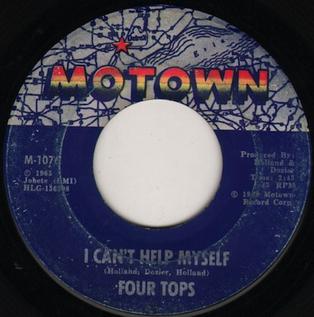
"I Can't Help Myself (Sugar Pie Honey Bunch)" is a 1965 hit song recorded by the Four Tops for the Motown label.
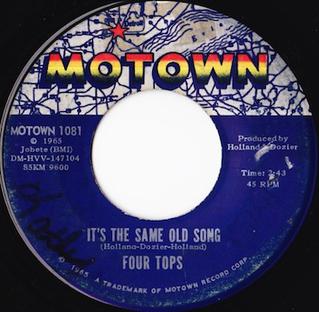
"It's the Same Old Song" was recorded by the Four Tops for the Motown label. It was released in 1965 as the second single from their second album. Written and produced by Motown's main production team Holland–Dozier–Holland, the song is today one of The Tops' signatures, and was reportedly created—from initial concept to commercial release—in 24 hours. It reached #5 on the Billboard Hot 100 and #2 on the Billboard R&B chart. It also reached #34 in the UK.
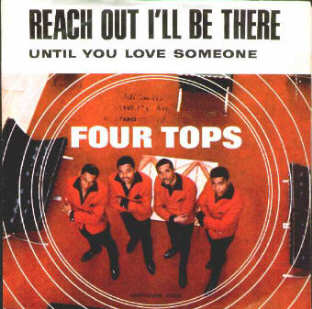
"Reach Out I'll Be There" (also formatted as "Reach Out (I'll Be There)") is a song recorded by the Four Tops from their fourth studio album Reach Out (1967). Written and produced by Motown's main production team, Holland–Dozier–Holland, the song is one of the most widely-known Motown hits of the 1960s and is today considered the Four Tops' signature song.
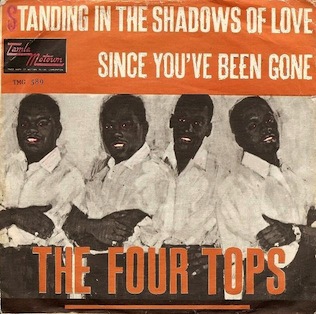
"Standing in the Shadows of Love" is a 1966 hit single recorded by the Four Tops for the Motown label. Written and produced by Motown's main production team Holland–Dozier–Holland, the song is one of the most well-known Motown tunes of the 1960s. A direct follow-up to the #1 hit "Reach Out I'll Be There", "Standing in the Shadows of Love" reached #2 on the soul chart and #6 on the Billboard Hot 100 in 1967. It also reached #6 in the UK. Though the song was well-received, it has received some criticism. Author Martin Charles Strong notes that it rehashed the formula of "Reach Out I'll Be There" and achieved similar success by reaching the Top 10 in both the US and UK. It is ranked #470 on Rolling Stone's list of The 500 Greatest Songs of All Time in 2010 and #464 in 2004.

"Bernadette" is a 1967 hit song recorded by the Four Tops for the Motown label. The song was written and composed by Holland–Dozier–Holland, Motown's main songwriting team, and produced by Brian Holland and Lamont Dozier.

"7 Rooms of Gloom" is a song recorded by the Motown Records vocal quartet the Four Tops. It was released as a single in 1967 on the Motown label and reached #14 on the Billboard Hot 100, and was a Top 10 R&B Hit, charting at #10. It was also a hit in the UK, their seventh, staying for nine weeks in the UK Singles Charts and reaching #12 and in the Netherlands where it made #23 in the Dutch Top 40.
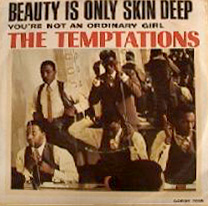
"Beauty Is Only Skin Deep" is a 1966 song, written by Norman Whitfield and Edward Holland, Jr., and produced by Whitfield. Norman Whitfield recorded the song's instrumental track. Two years later, Whitfield got together with Eddie Holland to have lyrics written for the song.

"Love Is Here and Now You're Gone" is a 1967 song recorded by the Supremes for the Motown label.
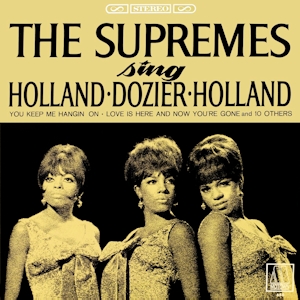
The Supremes Sing Holland–Dozier–Holland is the tenth studio album released by The Supremes for Motown in 1967. It includes the number-one hit singles "You Keep Me Hangin' On" and "Love Is Here and Now You're Gone". As the title states: all songs on the album were written and produced by Motown's main songwriting team of Holland–Dozier–Holland. Most of the album was recorded during the spring and summer of 1966; however several songs date back to the summer of 1964.
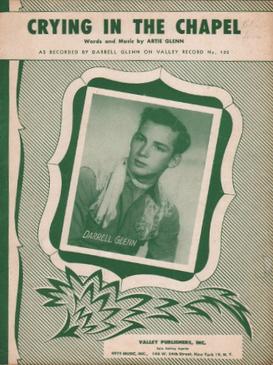
"Crying in the Chapel" is a song written by Artie Glenn and recorded by his son Darrell Glenn. The song was released in 1953 and reached number six on the Billboard chart.
"I'm Ready for Love" is a 1966 single by Motown girl group Martha and the Vandellas. The song, produced and written by Holland–Dozier–Holland, and was written in a similar style to The Supremes' smash hit, "You Can't Hurry Love".
"It's All in the Game" is a pop song whose most successful version was recorded by Tommy Edwards in 1958. Carl Sigman composed the lyrics in 1951 to a wordless 1911 composition titled "Melody in A Major", written by Charles G. Dawes, who was later Vice President of the United States under Calvin Coolidge. It is the only No. 1 single in the U.S. to have been co-written by a U.S. Vice President or a Nobel Peace Prize laureate.
"Little Darling (I Need You)" is a 1966 single written and produced by Holland-Dozier-Holland and recorded and released by Marvin Gaye on the Tamla label.

"Take Me in Your Arms (Rock Me a Little While)" is a song written by the premier Motown songwriting/production team of the 1960s Holland–Dozier–Holland. The first hit recording was sung by Kim Weston in 1965. It was most popular in 1975 when it was recorded by the Doobie Brothers.
"(Come 'Round Here) I'm the One You Need" is a 1966 hit single by Motown group The Miracles, released on Motown Records' Tamla label.

The Four Tops are an American vocal quartet from Detroit who helped to define the city's Motown sound of the 1960s. The group's repertoire has included soul music, R&B, disco, adult contemporary, doo-wop, jazz, and show tunes.
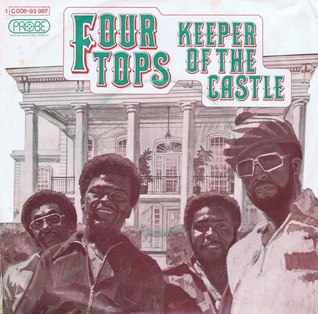
"Keeper of the Castle" is a song recorded and released by American singing group the Four Tops, notable as the first hit the group scored on the ABC-Dunhill label after leaving Motown in 1972. The song, a social commentary on men's roles in relationships, was co-written by Dennis Lambert, who also produced the song and other songs off their album of the same name.
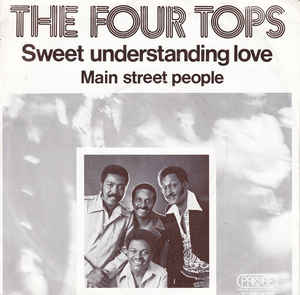
"Sweet Understanding Love" is a 1973 hit song recorded by the Four Tops for the ABC Records label. The song was the second of three single releases from their sixteenth studio album, Main Street People. The title track of the LP is on the B-side of the 45. "Sweet Understanding Love" was placed on their 1991 compilation album Ain't No Woman . It was also included on their album Anthology: 50th Anniversary (2004).
References
- ↑ "You Keep Running Away". www.discogs.com. 1967. Retrieved October 7, 2011.
- ↑ "Spotlight Singles" (PDF). Billboard. September 9, 1967. p. 18. Retrieved 2021-02-25.
- ↑ Whitburn, Joel (2004). Top R&B/Hip-Hop Singles: 1942-2004. Record Research. p. 212.
- ↑ "officialcharts.com". officialcharts.com. Retrieved July 6, 2021.